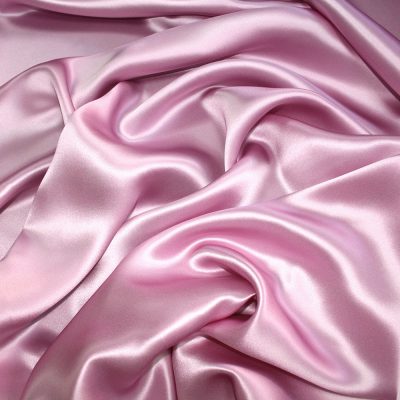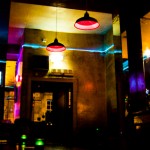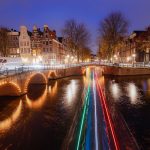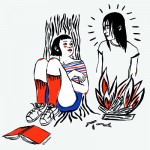By Naomi Ronner
Support independent, non-corporate media.
Donate here!

Cat takes me out dancing. She pulls me into places and drops me into scenes that make me susceptible to the idea of possibly being a party girl after all.
I arrive late. Dinner’s already cooling on the table. Cat waits behind the door like a 1950s housewife yearning for validation; for praise of her cooking, her new petticoat, the flowers she picked up at the market just before noon.
When I walk in, there are two plates of pink. Bowtie pasta, coated with ricotta and bleeding beets. Everything in this dish is blushing. Pink feels like the theme of the night. Or maybe the theme of the era; hers and mine.
We eat and talk. Talk about the boy she’s seeing who makes her want to wear nail polish. Who makes her consider heels. This is something new.
After dinner, she pulls out the strawberry-flavoured cigarettes she smuggled back from Beijing. We smoke them on the balcony, slim pink-rimmed rolls between our lips, the city whining beneath us.
‘Cat,’ I say, eyes wide, my voice laced with ironic dread.
‘In less than three months I’ll be twenty-five.’
‘Do you think Apollo ever turned twenty-five?’ Cat asks me, laughing through smoke. I lean over the railing, head tipped back until the city turns upside down, as if seeing the world from this angle might shift something irreversible inside me. A tram screeches and shakes the whole building.
I shake my head. ‘No. They outlive us. While we try to rot beautifully.’
Cat exhales through her nose, the way people do when they don’t want to laugh. I’m not offended by it, because I’m fixated on that number: twenty-five.
A quarter of a century.
‘By twenty-five,’ I say, ‘you’re supposed to have your first proper job, a dead houseplant, and a tattoo you don’t show anyone.’
Cat flicks ash off the edge of the bench. ‘By twenty-five,’ she says, ‘Apollo had probably fathered twelve muses and killed two monsters. But sure babes, let’s talk about houseplants.’ How would those people down below perceive me? People with bosses and mortgages; dinner reservations and expensive gym memberships? What am I to them?
‘I just wish it wasn’t so hard,’ I say. ‘Every year of growing wiser is a fucking pain in the ass.’
Back home in Germany, when I had my first depressive episode, my mother feared it was the same kind as my father’s. As a kid, he used to call his better days “the golden flashes before the crash”. I didn’t understand what he meant back then. I thought he was talking about the weather, but as my mind matured, storms and clouds felt like minor nuisances compared to his tantrums, his silence, the heaviness he filled every room with. My mother begged me to stay in Germany for university, but I couldn’t get out fast enough. ‘I’m not like him’, I told her. She knew I wasn’t like my younger brother Theo either, but still, she worried something had been passed down to me. If my father could hand it to one child, why not the other? When I was ten, the stress at home made my hair fall out in patches. My mother kept the strands in a box, like a warning: this is what happens when you worry.
‘You should detach from the world a little and read some poetry,’ Cat says, nonchalantly.
‘I’ve got some Louise Glück lying around somewhere.’ Cat stubs her cigarette into a bucket of parched soil, where the roots of dead flowers curl like nerves. She starts digging through the piles of clothes strewn across her studio, muttering,
‘I swear she was here yesterday.’
‘So, what’s with all the pink?’ I ask her, as she frantically tosses clothes into the air; a sight both festive and maybe a little hostile. I’m still on the sidelines, surveying this newly discovered world: the sky like an ocean, and the buildings suspended in it, grey icicles dangling from the cave-ceiling of the city. She laughs. ‘I’m trying out soft power,’ she says.
‘Feminine-coded rebellion. You know. War in pink.’
‘Here she is.’ Cat hands me the Louise Glück collection, and I take it. I take whatever it is she’s offering me.
***
On the way to the bar, a place tucked near the water, folded by the river reflecting nature and replica; moonlight and city light, I buy bubblegum from a kiosk in the station. I never buy bubblegum. But I’m not twenty-five yet, and maybe the theme is pink, just this once. I notice how often I narrate my life in negotiations; before and afters, ifs and thens, as if time itself needs a framework to stand on. A month before I left for Amsterdam, Theo was sent to prison for six months. He broke someone’s face. I don’t know why. It was his worst psychosis so far. Cat doesn’t know, though she does know I see a therapist once a week. There are days I vanish inward. My condition obviously isn’t as severe as Theo’s or my father’s, but I have depressive episodes that pin me to the sofa, numbed and unreachable. I’ll binge-watch Tabaluga and eat only Weetabix, not speaking to anyone for days. ‘Talk to someone’, my mother urged me, her voice the dull clang of worry.
In the bar, we dance to loud, joyful Balkan music with young American tourists and people over fifty. I get tipsy off two small glasses of white wine and avoid eye contact with the old men staring at me — my silver earrings, big and round like antique doorbells or the pistil of a sunflower, drawing attention to my bare neck and shoulders. These men are so old, I think, they should have their eyes poked out for staring.
The American tourists are drunk too. In the lavatory, they ask us to photograph them, the blue and purple light turning them into aliens. After we capture their night out, they shower us with exaggerated ‘thank you’s’ and then leave the grape-coloured glow. Outside, smoking another strawberry cigarette, I tell Cat I’ve got nowhere to toss my gum. No trash can is in sight. She hands me a paper bill, Chinese money. I press the gum straight onto Mao’s face. I think about what Theo would’ve said. He used to collect money from all over the world.
‘Your lipstick looks immaculate,’ I tell Cat, as if that’s the most obvious thing in the world, thinking Theo away.
‘I think I might get fired from my internship,’ she says in a tone I can’t quite read. Is she joking? Or would she be devastated? The boy is occupying her mind too much. She’s like me back in Germany, a year ago; confused about where the head ends and the heart begins. ‘Why?’ I ask. ‘What did you do, Kitty Cat?’
***
After we leave the bar, the night really starts to peel open for me. I make the dangerous decision every Amsterdammer makes on a Friday night: I get on my bike after a couple drinks. The white wine has softened every bit of skepticism I’ve been building, toward the world and this city in particular. Tonight, happiness is something as simple, and as shameless, as being drunk on the bike.
Cat is taking the bus. I suspect she’s going to see the boy she pretends not to love. ‘Roxanne’, she said gloomily, two months ago, while I was wrestling with my melting ice cream; mascarpone and clementine, my new favourite, though it tasted a little less wonderful with her sadness spilling into my thoughts.
‘I foresee that I’m going to get my heart broken.’
“Crack” she said, mimicking the sound of her yet-to-be-broken heart.
I wanted to tell her that I get my heart broken everyday, but I know she was talking about a different kind of heartbreak.
My therapist thinks I should use my porous heart to let things seep through, instead of retaining everything like a sponge. She said I’m like the upper layer of the moon — lunar regolith — full of tiny holes, catching every one of the world’s tears.
‘You can’t live like that, Roxanne. It’ll crush you.’
I yelled at her and stormed out. ‘How can you be enlightened, aware of the state of the world, of civilisation, and not be depressed?’ I’d shouted.
The world is falling apart. It’s always falling apart. The ones who seem fine, who cope, they’re the ones who need help the most.
Sometimes I like to think that this heaviness, this constant grief for a world that shrugs off its own destruction like a bad coat, is what fuels Theo’s rage. That he can’t bear how pain is ignored, filed away like expired bread. That maybe I inherited that part too.
***
Amsterdam looks better from the view of a bike. I sing along to The Pixies, loud, full volume, like the song is pouring out of me. Some songs are just too big,
or maybe we’re just too small. The skyline is dipped in Indian ink; blue and orange have now crowded out the pink that was very much present earlier. Pink is the colour of things just before they bruise. Flesh, relationships, dreams, morality and ethics. The polluted city air rushes through my hair and enters the cave of my breath. The buildings feel like friends. I feast with them on the charm of the present, eternally..
A delivery guy behind me asks if I’m okay, but he doesn’t exist to me.
For a moment, I’m free of that tired desire to belong somewhere.
To my body. To a lover’s arms. To a city. There’s a paradise inside me, and for now, I’m keeping it all to myself.
When I arrive in my street, everything speaks to me: the Dutch poet who always tapes his latest poem to the window, the lilac bush I sometimes steal from, the wooden spiral staircase transporting people from above to below, and vice versa.
Lunar regolith.
Inside, I realise I’m hungry. I fetch a bowl of Weetabix; let the wholegrain bars float in cold milk. Three in the morning, and everything is quiet. I promised to text Cat when I got home.
“I’m home, Dionysus. The wine has worn off, only a little. The city is still spinning.” Send.
Outside, it’s just started to rain, as though it waited for me to return. I sit still for a moment, my spoon resting in the bowl, the Weetabix disintegrating in the milk. Is it all I know? All I’ve ever known, perhaps; being swallowed by heaviness. Breathing through wool. Swimming through honey.
My thoughts circle back to the day we saw Theo off to prison. Mum stood under an umbrella that day, though it wasn’t raining. She kissed Theo goodbye and waved as he turned into an inmate. But I think she was also waving at Dad. And maybe even at me.
‘Why are you carrying an umbrella?’ I asked her.
‘Because all the raining that needs to happen will happen now.’ And out of nowhere, the sky split open and it started to pour.
***
I wake up to my phone buzzing; two texts from Cat and a missed call from my mother. I don’t open them.
My eyes feel like they’ve been dusted with flour and my head aches with the aftermath of a body that existed too much the night before. The cereal bowl is still on the floor next to the bed, a small graveyard of soggy Weetabix and half dried milk.
I slide the Louise Glück book from the floor where I dropped it last night, just before going to bed. I plop the book open to a poem called ‘The Empty Glass’. After finishing it, I pause and then read it again, mouthing the words like I might ruin them by saying them out loud.
It feels like the poem is talking back to me. Like it knew about the cigarette ashes and the gum stuck on Mao’s face and the weight in my limbs that sometimes lasts for weeks. I try.
I am trying.
My mind wanders to Theo. To Cat. To my mother waving with her dry umbrella. Then I close the book, roll to the other side of the bed and stare at the ceiling for a long, long time.
I think my problem with adulthood isn’t the responsibility that inevitably comes with it, but the almost languid acceptance of glasses always being “half empty”; the emotional resignation. If a glass is half empty, it’s also half full — and half full, in adult terms, is good enough. It seems to me that perishing behind a desk, while watching the world turn sour from the sidelines, requires a kind of complacent optimism to refrain oneself from going mad. This is different from being wise. True wisdom is inherently sorrowful. To be wise is also to be sad. In fact, maybe wisdom is the saddest gift of all. And pink is a pipe dream; too grave, too mournful a colour to be dismissed as heartening.
‘What now Apollo?’ I ask — and as if he isn’t just a dead god or a discarded virtue, he answers and even quotes Glück.
‘Get a birthday cake first. Then a job, a houseplant and a tattoo. And hide, as best as you can, all the impurely motivated recurring attempts to build character.’









